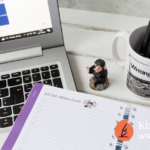
One of the many benefits of writing a blog is that it helps your future customers get to know you. You can talk to them about the stuff they’re interested in like a human being rather than a corporate cardboard cut-out. A lot of people love the idea of buying from a small business, but they’re wary of being ripped off. The end result is that they go and buy something from a reliable big-name brand and not you. A blog helps you to overcome that by letting them see the person behind the business. Of course, the downside of this is that you have to put yourself front and centre. The idea of sharing your story is all very well, but what if there are still parts of your life that you want to protect? The good news is that you can write a blog and still maintain your privacy. You just need to follow a few simple steps.
Consider the law
There are certain professions where you need to be careful about what you write. If you offer any kind of medical or psychological treatment, it goes without saying that your patients’ information is confidential. You could potentially still write case studies, but they’d have to be heavily anonymised. You’d also still need the patient’s permission.
A lady at one of my workshops had signed an NDA, which meant she wasn’t allowed to talk about her former employer at all. Even an anecdote could potentially be recognisable. In circumstances like that, you should probably stick to referring to something that an experience taught you rather than the experience itself.
Set your boundaries
Before you start writing your blog, it’s a good idea to consider what you’re willing to share. The ultimate aim in writing a blog is to promote your business. Your focus should always be on your customer and what they need to know. Personal information is what helps you to show your customer that you’re their kind of person.
If you work with parents and have children yourself, it gives you common ground. However, you can still draw a line. Think about how much of your family life you’re willing to share and set your personal boundaries early on.
Give the edited highlights
Once you’ve decided how much information you’re able and willing to share, you can start getting specific. One of my key priorities is to protect my children’s privacy. As you can see, it doesn’t mean that I can’t mention them at all. There are so many common reference points between parents that you can be a bit generic and still strike a chord. (In fact, it’s one of the few places where cliché can sometimes work.) Every parent knows the struggle of a non-sleeping baby or trying to get small children to put their shoes on.
Whatever you want to say, think about the ways you can offer a shared experience.
Other people in your blog
The way you talk about other people in your blog doesn’t just apply to your children. There’s a potential story in every encounter you have with a client, networking contact or even someone in a Facebook group. There are certain types of conversations that you might have on a regular basis, but others will be unique. Think about whether the person you’re writing about could be identified from the information you’ve given. If they are, you might still be able to talk about them, but get their permission first. (In case you’re wondering, I’ve been in touch with the NDA lady to get the OK from her.)
If you’d like a chat to find out how I can help you put more personality into your marketing, you can book a call here.
Alternatively, sign up for my mailing list here, and I'll send you a free copy of my eBook '50 blog topic ideas for your business' as a thank you.



